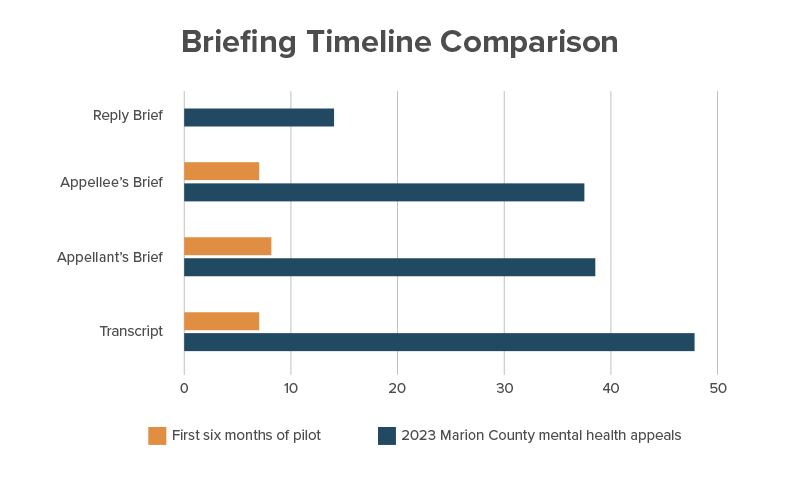By Greg Pachmayr | Clerk of the Appellate Courts

Subjects of involuntary temporary mental health commitments in Indiana can be left without meaningful appellate relief. Indiana Code 12-26-6 states that an individual alleged to be mentally ill and either dangerous or gravely disabled may be committed for not more than 90 days. The standard appellate timeline is approximately 150 days after which the Court of Appeals starts drafting an opinion. These timelines can lead to some appeals being treated as moot.
Following a recommendation from members of the Rules Committee, the Chief Justice directed that a group of stakeholders convene to address this issue. Stakeholders included representatives from: counsel for mental health care providers, the Court of Appeals of Indiana, the Marion County judiciary, the Marion County Public Defender Agency, the Office of the Indiana Attorney General, and the Office of Judicial Administration.
The group came to an agreement on the parameters of the program proposal, including shortened briefs (4,200 words instead of 14,000 words) and briefing periods (25 days instead of 150 days). The group agreed that the major obstacle to resolving these types of appeals on the merits are the transcripts, as many court reporters indicate that their standard 45-day timeline is already difficult to meet.
| Current Rule: Appellant’s Brief | Pilot Rule: Appellant’s Brief |
|---|---|
| 14,000 words or 30 pages | 4,200 words or 10 pages |
| Tables of Contents and Authorities | n/a |
| Statement of the Issues | Statement of the Issues limited to sufficiency of the evidence |
| Statement of the Case | n/a |
| Statement of the Facts | Statement of the Facts |
| Summary of the Argument | n/a |
| Argument | Argument |
| Conclusion | n/a |
Working closely with the Marion County Superior Court Chief Technology Officer, project leaders learned that one of their vendors, The Record Exchange (TRX), has voice to text capabilities. Using TRX’s system as a starting point, an Artificial Intelligence natural language generation program was implemented to increase the accuracy of the initial voice to text work product.
This new AI augmentation is powered by Anthropic. It is a closed system, meaning that all the data, including the hearings, are kept confidential and are not fed into the larger public AI model. The pilot-specific library was enhanced with medical and legal resources pertinent to these mental health case types. After the initial hearing, the voice to text work product is run through the Anthropic AI system. Within mere minutes a transcript is generated that can be used on appeal.

After robust testing, the Indiana Supreme Court issued an order authorizing a two-year pilot project utilizing the new system. The pilot went live September 1, 2024. In the first six months of the pilot, seven expedited cases were initiated. Of these seven cases, the average time from the Notice of Appeal to the Court of Appeals opinion was 30.85 calendar days. For comparison, 2023 mental health appeals from Marion County averaged 143.3 days from Notice of Appeal to opinion or dismissal.
Six Court of Appeals judges volunteered to be on panels hearing these expedited cases. Court of Appeals Chief Judge Robert Altice said, “When the Rules Committee proposed this pilot project our Court immediately signed on and embraced the project. We are excited that we have been able to reduce the time it takes for the parties to receive a decision in their case.”
The Court of Appeals judges are dedicated to thoroughly weighing counsels’ arguments and issuing opinions as efficiently as possible. Of the initial cases, the average time for an opinion to be issued after the case was fully briefed was 8.42 calendar days. Likewise, the Indiana Supreme Court has quickly addressed petitions to transfer in these cases. Of the seven initial cases, three included petitions to transfer, and the Supreme Court issued orders on those petitions within an average of 3 calendar days after the Response to Transfer was filed.
While only six months into the two-year pilot, the initial results of the project are very promising. The hard work of counsel, the courts, and their staff is commendable and serves as an example of collaboratively engaging new technology to create efficiencies.